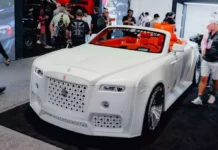Finding mouse droppings or footprints in the engine compartment is every car owner’s nightmare. These signs indicate that your car has become a favorite haunt of these terrible rodents.
Usually, mice crawl into cars to nest, bringing in trash from the outside, chewing it into small pieces, and scattering it inside the vehicle. They also defecate indiscriminately, turning your car’s engine compartment into a garbage dump. The air conditioning system is the first to be affected by this.
Additionally, the rodents’ propensity to gnaw on things can damage plastic, rubber, and electrical wires in the engine compartment. They can also harm the cooling system, preventing the engine from effectively cooling down during operation and causing internal wear and tear, reducing the vehicle’s lifespan.
Most importantly, their habit of chewing means that electrical wires are often their first target. When these wires are bitten, the car’s electrical system may malfunction, causing damage to various components and even posing a fire hazard.
Whether the damage caused by mice is extensive or minor, car owners will have to spend time and money on repairs. Minor issues may only require a thorough cleaning of the interior and engine compartment, but more severe problems, such as a faulty air conditioner or electrical system, can cost car owners tens of millions of Dong to fix and replace damaged parts.
More importantly, rectifying the consequences of rodent infestation can take several days, impacting the owner’s work and daily routine.
Upon discovering signs of mice in the engine compartment, many car owners have tried various methods to repel and prevent their return, such as using mouse repellent bags, applying kerosene, or placing camphor balls. However, most of these measures prove ineffective, and the mice often return quickly.
Mr. Phuong, the owner of a car wash on Lien Tri Street in Hanoi, shared that after years of washing cars, he noticed a common pattern among vehicles infested with mice in the engine compartment. These cars are usually very dirty, providing a ready food source for the rodents, and they emit a distinct odor. Therefore, the first step to preventing mice from returning to the engine compartment is not buying repellent bags or using chemicals but thoroughly cleaning the engine compartment.

Car cleaning process to prevent mouse infestation. (Video: Hoang Hien, Duy Tung)
Thorough engine compartment cleaning is the most effective way to keep mice out of your car.
Mr. Phuong explained that cleaning the engine compartment helps eliminate mouse droppings, urine, and food remnants. The chemicals used in the cleaning process also help neutralize the unpleasant odor that attracts mice and confuses them when they try to find their nest. Lastly, a clean engine compartment makes the engine block look shiny and new.
A clean and shiny engine compartment after a thorough wash.
In other words, preventing mice from nesting in your car’s engine compartment is relatively simple. To ensure the cleanliness and safety of your vehicle from rodent attacks, car owners should maintain hygiene in both the interior and engine compartment, refrain from eating or storing food in the car, and regularly inspect the engine compartment to ensure it remains clean and mouse-free.









































